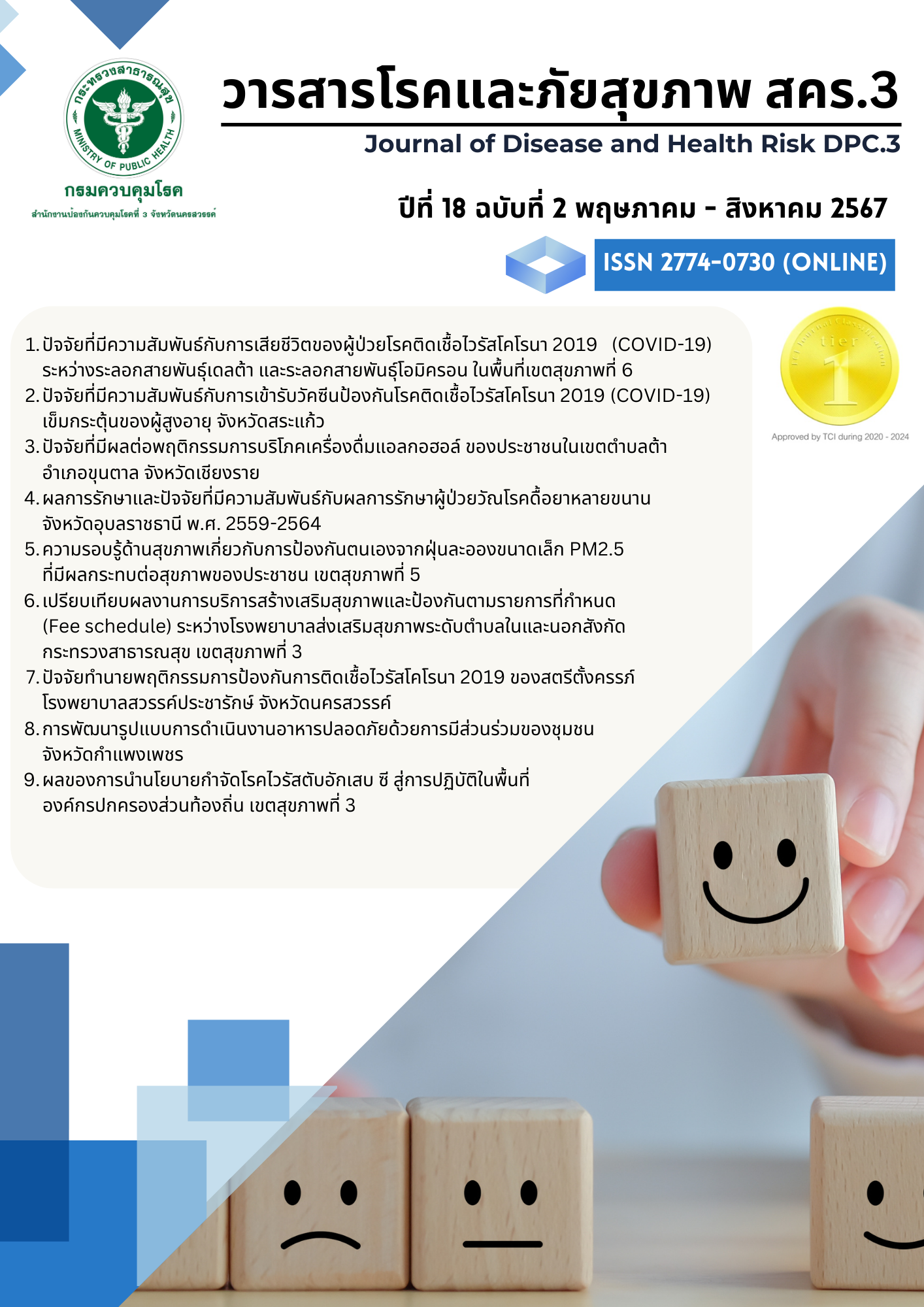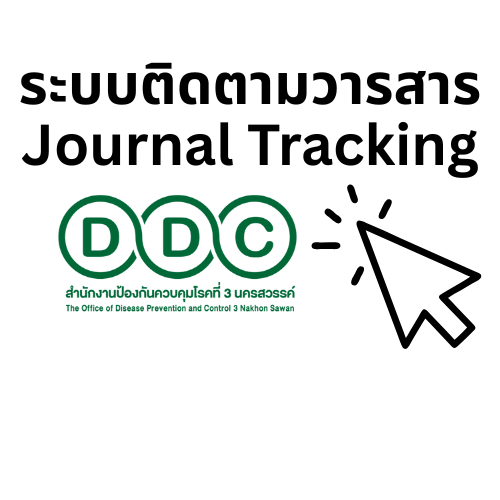Factors Predicting Preventive Behaviors of Coronavirus 2019 Among Pregnant Women in Sawanpracharak Hospital Nakhon Sawan Province
Keywords:
Health belief perception , Preventive behaviors of Coronavirus 2019 , Pregnant womenAbstract
The physiological changes of pregnant women can increase the risk of respiratory tract infections. It found that many pregnant women were infected with the coronavirus 2019 during the outbreak. This cross-sectional descriptive study purposed to study the levels of the preventive behaviors and factors predicting the preventive behaviors of the coronavirus 2019. The 153 pregnant women attending antenatal care at Sawanpracharak Hospital were selected by purposive sampling. Data was collected by the questionnaires which was analyzed the validity by Cronbach's alpha coefficient of 0.74 and 0.76. Analyzing the data used the descriptive statistics and multiple regression analysis. The results showed that pregnant women's prevention behavior against coronavirus disease 2019 was at a convenient level. (Mean=2.3, S.D.=0.44). Factors perceiving the health beliefs regarding the coronavirus 2019 and perceiving the benefits of behavioral practices were correlated with the prevention behaviors of coronavirus 2019 infection with a multiple correlation coefficient of 0.49. If the perceived benefit of the behavior practice increased by 1 point, the prevention behavior of coronavirus 2019 infection increased by 0.608 points (b = 0.608) It was able to predict the preventive behavior of coronavirus 2019 infection by 23.60% with a statistical significance at the .001. Thus, the health agencies should be encouraged about the advantages and disadvantages of infectious prevention for pregnant women for the correct and proper practice can prevent disease effectively.
References
Department of disease control. Guidelines for prevention of coronavirus disease 2019 (COVID-19) or COVID-19 for the general public and at-risk groups. Department of disease control [Internet]. 2021 [cited 2022 October 10]. Available from: https://ddc.moph.go.th (in Thai)
Ministry of Public Health. Caring for COVID-19 patients after recovery (Post COVID syndrome) or Long COVID condition for doctors and public health personnel. Ministry of Public Health [Internet]. 2021 [cited 2022 November 10]. Available from: https://covid19.dms.go.th/backend/Content/Content_File/Covid_Health/Attach/(in Thai)
Perinatal Society of Thailand. COVID-19 infection situation in Pregnant women, women 6 weeks postpartum, and newborns between 1 December 2020 - 30 May 2021. Perinatal Society of Thailand [Internet]. 2021 [cited 2022 October 22]. Available from: https://www.thaiperinatal.com/news/category/5-0-0-COVID-19 (in Thai)
Wirifai S, Laddangam P. Coronavirus disease 2019 (COVID-19) and pregnancy: challenges for midwives. Journal of Nursing Siam University 2021;22(43):89-102. (in Thai)
Nakju S. Behaviors to protect yourself from infection with coronavirus 2019 (COVID-19) of people in Bangkok. Public Health Journal 2021;23(5):832-841. (in Thai)
Yaowarat N, Mangkamanee S, Wihakhahan P. Factors predicting behavior to prevent COVID-19 infection. of the mother after giving birth. Journal of Health and Nursing Education 2022;28(1):1-16.
Ministry of Public Health. Life Course Approach To Health. Ministry of Public Health [Internet]. 2022 [cited 2022 October 22]. Available from: https://dashboard.anamai.moph.go.th/dashboard/mmr/index?year=2021 (in Thai)
Cohen, J. (1977). Statistical power analysis for the behavioral sciences (Rev. ed.). Lawrence Erlbaum Associates, Inc.
Wongthi S. Factors affecting the behavior of the Department of Disease Prevention, Corona Virus 2019. of village health volunteers Sukhothai Province. Master of Public Health Naresuan University; 2021.
Chandrabenjakul W. Prevention of infection with coronavirus 2019 [Internet]. 2022. [cited 2022 November 11]. Available from: https://ddc.moph.go.th/viralpneumonia/file/g_km/handout002_26022020.pdf (in Thai)
Charoensin S. Factors influencing coronavirus prevention behavior
of high school students in Mueang Nakhon Sawan District Nakhon Sawan Province [Internet]. 2021. [cited 2022 November 11]. Available from: http://203.157.71.163/kpi/uploads/20220509090514 (in Thai)
Phaowattana A, Klamphakorn S, Lakampan S, Amnatsatsai Sue K. Promoting health and preventing disease in the community: applying concepts and theories to [Internet]. 2021. [cited 2022 November 11]. Available from: https://dol.thaihealth.or.th/resourcecenter/sites/default/files/documents/64kaarsraangesrimsukhphaaphaelapngkanorkhainch.pdf(in Thai)
Khompayak J, Durongritthichai W. Community health nursing: concepts, principles and nursing practice. Samut Prakan: University Press Project Hua Chiew Chaloem Phrakiat; 2010.
Jirojkul P. Concepts, theories, health promotion and their use. Nonthaburi: Academic Welfare Project Praboromarajchanok Institute; 2013. (in Thai)
Thaiyapirom N, Klanklin P. Child health promotion. Chiang Mai: Krongchang Printing; 2011.
Chomya R, Pansri K. Awareness about behavior to prevent contracting the new coronavirus disease (COVID-19): A comparison between ages. Journal of Humanities and Social Sciences Mahasarakham University 2020;39(6):71-82. (in Thai)
Goldfarb, IT, Clapp, MA, Soffer, MD, Shook, LL, Rushfirth, K., Edlow, AG, & Bryant, AS. Prevalence and severity of coronavirus disease 2019 (COVID-19) illness in symptomatic pregnant and postpartum women stratified by Hispanic ethnicity. Obstetrics and gynecology 2020;136(2):300.
Charoenchan T, Surinya T. Health beliefs Self-efficacy, parenting style and self-care behavior of high school students at Satri Nonthaburi School. Nonthaburi Province. Journal of Social Sciences and Humanities 2014;40(1):69-84. (in Thai)
Chamnoi P. Educational knowledge level Perception and behavior of dengue fever control operations among public health volunteers. Case study of Phan Kratai District Kamphaeng Phet Province. Disease Control Journal 2016;42(2):138-150. (in Thai)
Mansaket K, Rawirakul T, Lakampan S. Effects of a self-management program on blood sugar control. of patients with type 2 diabetes who use insulin. Journal of Health and Nursing Education 2019;25(2):12-30. (in Thai)
Weerakachorn P, Kwanphichit C, Nowsuwan K, Singweeratham N. Perception and Behavior Prevention of coronavirus disease 2019 (COVID-19) of personnel working in the Medical Administration Center Doctors in the southern border provinces. Journal of Public Health and Health Sciences 2020;3(3):106-17. (in Thai)
Panuan W. Knowledge and skills in prevention and control of dengue fever among village health volunteers in Pai District. Mae Hong Son Province (Master's Thesis, Chiang Mai Rajabhat University) [Internet]. 2017 [cited 2022 November 11]. Available from: http://cmruir.cmru.ac.th/bitstream/123456789/1528/1/F432995.pdf (in Thai)
Rattanapanya W. Factors influencing disease surveillance and control behavior. Dengue fever among village health volunteers, Mae Rim District, Chiang Mai Province. Ratchapruek Journal 2018;16(2):87-96. (in Thai)
Waehayee H. Perception of violence and prevention behavior of coronavirus disease 2019 (COVID-19) among teenagers in Sateng Nok Subdistrict. Mueang District, Yala Province. Community Public Health Journal 2020;6(4):158-168. (in Thai)
Bunthan W, Waikid P, Soisaeng W, Soinak C, Akkarathanapon P(in Thai), Khompayak J. Factors influencing health promotion behavior in preventing addiction. Coronavirus 2019 (COVID-19) of the elderly. Police Nursing Journal 2020;12(2):232-246. (in Thai)
Klomjai T, Kaewjaiboon J, Chatchawarat T. People's knowledge and behavior regarding self-protection. From infection with the new strain of coronavirus 2019. Journal of Nursing, Public Health and Education 2020;21(2):29-39. (in Thai)
Atchison C, Bowman LR, Vrinten C, Redd R, Pristerà P, Eaton J, et al. Early perceptions and behavioural responses during the COVID-19 pandemic: a cross-sectional survey of UK adults. BMJ Open 2021;11(1):e043577.
Clark, C., Davila, A., Regis, M., & Kraus, S. Predictors of COVID-19
voluntary compliance behaviors: An international investigation. Global transitions; 2020. p.76-82.
Chen, H., Guo, J., Wang, C., Luo, F., Yu, X., Zhang, PW, & Zhang. Y.
Clinical haracteristics andintrauterine vertical transmission potential of COVID-19 infection in nine pregnant women:a retrospective review of medical records. The lancet 2020;395(10226):809-815.
Elling, R., Whittemore, R., & Green, M. Patient participation in a pediatric program. Journal of Health and Human Behavior 1960;1(3):183-191.
Health Protection Scotland. Infection prevention and control in day childcaresettings. 2020.
Jafari, M., Pormohammad, A., Sheikh Neshin, SA, Ghorbani, S., Bose, D.,
Alimohammadi, S., & Zarei, M. Clinical characteristics and outcomes of pregnant women with COVID‐19 and comparison with control patients: A systematic review and meta‐analysis. Reviews in medical virology 2021;31(5):1-16.
Kasl, SV, & Cobb, S. Health behavior, illness behavior and sick role behavior: Health and illness behavior. Archives of Environmental Health: An International Journal 1966;12(2):246-266.
Paakkari, L., & Okan, O. COVID-19: health literacy is an underestimated problem. The Lancet Public Health 2020;5(5):249-250.
Downloads
Published
How to Cite
Issue
Section
License
Copyright (c) 2024 Journal of Disease and Health Risk DPC.3

This work is licensed under a Creative Commons Attribution-NonCommercial-NoDerivatives 4.0 International License.
Copyright notice
Article published in the Journal of Disease and Health Risk DPC.3 Nakhon Sawan. It is considered a work of academic research and analysis as well as the personal opinion of the author. It is not the opinion of the Office of Disease Prevention and Control 3, Nakhon Sawan. Or the editorial team in any way Authors are responsible for their articles.
Privacy Policy
Name, address and e-mail address specified in the Journal of Disease and Health Risk DPC.3 Nakhon Sawan. It is used for identification purposes of the journal. And will not be used for any other purpose. Or to another person.









